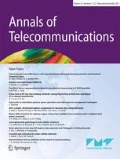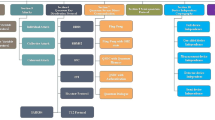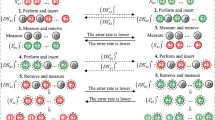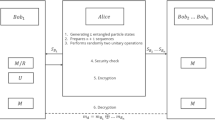Abstract
We devise a simple protocol. A client delegates his or her quantum computation to a remote server in accordance with the inputs and instructions. Alice, the client, has a classical computer or limited quantum technologies, and these are not sufficient for the universal quantum computation at her disposal. Bob, the server, owns a fully-fledged quantum computer and promises to execute the computation honestly. The protocol itself is half-blind, that is, Bob may learn which quantum gate he implements but nothing about Alice’s inputs and outputs. Furthermore, Alice is only required to send qubits and perform Pauli gates. Finally, we analyze the security, universality, half-blindness and correctness, and briefly discuss its defects, extension and verification.






Similar content being viewed by others
References
Nielsen MA, Chuang IL (2010) Quantum computation and quantum information. Cambridge University Press, Cambridge
Feynman RP (1982) Simulating physics with computers. Int J Theor Phys 21(6–7):467–488. doi:10.1007/BF02650179
Shor PW (1994) Algorithms for quantum computation: discrete logarithms and factoring. In: Foundations of computer science, 1994 Proceedings, 35th annual symposium on IEEE. doi:10.1109/SFCS.1994.365700
Veluru S, Rahulamathavan Y et al (2007) Privacy Preserving text analytics: research challenges and strategies in name analysis, 4.Book on securing cloud-based databases with biometric applications? IGI Global, USA. doi:10.1111/j.1467-9760.2007.00268.x
Childs A (2005) Secure assisted quantum computation. Quantum Inf. Comput. 5:456–466. doi:10.1134/1.2053342
Broadbent A, Fitzsimons J, Kashefi E (2009) Universal blind quantum computation. In: Proceedings of the 50th annual IEEE symposium on foundations of computer science (FOCS 2009), pp 517–526. doi:10.1109/FOCS.2009.36
Raussendorf R, Briegel HJ (2001) A one-way quantum computer. Phys Rev Lett 86:5188. doi:10.1103/PhysRevLett.86.5188
Raussendorf R, Browne DE, Briegel HJ (2003) Measurement-based quantum computation on cluster states. Phys Rev A 68:022312. doi:10.1103/PhysRevA.68.022312
Raussendorf R (2003) Thesis PhD. Ludwig-Maximillians University Munchen
Barz S, Kashefi E, Broadbent A, Fizsimons J, Zeilinger A, Walther P (2012) Demonstration of blind quantum computing. Science 20:303–308. doi:10.1126/science.1214707
Morimae T, Dunjko V, Kashefi E (2015) Ground state blind quantum computation on AKLT State. Quantum Inf Comput 15(3–4):200–234. doi:10.1103/PhysRevLett.108.200502
Morimae T, Fujii K (2012) Blind topological measurement-based quantum computation. Nat Commun 3:1036. doi:10.1038/ncomms2043
Morimae T (2012) Continuous-variable blind quantum computation. Phys Rev Lett 109:230502. doi:10.1103/PhysRevLett.109.230502
Sueke JT, Koshiba T, Morimae T (2013) Ancilla-driven universal blind quantum computation. Phys Rev A 87:060301(R). doi:10.1103/PhysRevA.87.060301
Li Q, Chan WH, Wu C, Wen Z (2014) Triple-server blind quantum computation using entanglement swapping. Phys Rev A 89:040302(R). doi:10.1103/PhysRevA.89.040302
Sheng YB, Lan Zhou (2015) Deterministic entanglement distillation for secure double-server blind quantum computation. Sci Rep 5(2015):7815(R). doi:10.1038/srep07815 /Sci Rep 5(2015): 7815
Arrighi P, Salvail L (2006) Blind quantum computation. Int J Quantum Inf 4 (5):883–898. doi:10.1142/S0219749906002171
Morimae T, Fujii K (2013) Blind quantum computation protocol in which Alice only makes measurements. Phys Rev A 87:050301(R). doi:10.1103/PhysRevA.87.050301
Dunjko V, Kashefi E, Leverrier A (2012) Blind quantum computing with weak coherent pulses. Phys Rev Lett 108:200502. doi:10.1103/PhysRevLett.108.200502
Giovannetti V, Maccone L, Morimae T, Rudolph T G (2013) Efficient universal blind quantum computation. Phys Rev Lett 111:230501. doi:10.1103/PhysRevLett.111.230501
Mantri A, Perez-Delgado C, Fitzsimons JF (2013) Optimal blind quantum computation. Phys Rev Lett 111:230502. doi:10.1103/PhysRevLett.111.230502
Morimae T, Fujii K (2013) Secure entanglement distillation for double-server blind quantum computation. Phys Rev Lett 111:020502. doi:10.1103/PhysRevLett.111.020502
Rivest RL, Shamir A (1978) A method for obtaining digital signatures and public-key cryptosystems. Commun ACM 21:120–126. doi:10.1145/359340.359342 /Commun ACM 21:120–126
Zhu R, Tan Y, Zhang Q, Wu F, Zheng J, Xue Y (2016) Determining image base of firmware files for ARM Devices. IEICE Trans Inf Syst E99D(2):351–359. doi:10.1587/transinf.2015EDP7217
Ikeda M et al (2011) Advances in imaging detectors and applications. Proc SPIE 8194
Allahverdyan AE, Balian R, Theo M, Nieuwenhuizen (2016). A sub-ensemble theory of ideal quantum measurement processes, arXiv:1303.7257. doi:10.1016/j.aop.2016.11.001ArmenE
Ambainis A, Mosca M, Tapp A, De Wolf R (2000) Private quantum channels. In: Proceedings of the 41st annual IEEE symposium on foundations of computer science (FOCS 2000), pp 547–553. doi:10.1109/SFCS.2000.892142
Gottesman D (1998) The Heisenberg representation of quantum computers. In: Group 22: proceedings of the XXIL international colloquium on group theoretical methods in physics, pp 32–43. doi:10.1016/B978-0-444-86972-2.50029-0
Gupta BB, Agrawal DP, Yamaguchi S (2016) Handbook of research on modern cryptographic solutions for computer and cyber security. IGI Global Publisher, USA. doi:10.4018/978-1-5225-0105-3
Barnum H, Crepeau C, Gottesman D, Smith A, Tapp A (2002) Authentication of quantum messages. In: Proceedings of the 43rd annual IEEE symposium on the foundations of computer science (FOCS02), pp 449–458. doi:10.1109/SFCS.2002.1181969
Sun Z, Zhang Q, Li Y, Tan Y (2016) PPDL: a dynamic partial-parallel data layout for green video surveillance storage. IEEE Trans Circuits Syst Video Technol. doi:10.1109/TCSVT.2016.2605045
Broadbent A (2015) Delegating private quantum computations. Can J Phys 93(9):941–946. doi:10.1139/cjp-2015-0030
Acknowledgments
The research is funded by the National Natural Science Foundation of China, under Grant Nos. 61672014 and 61502200, and Natural Science Foundation of Guangdong Province, China, under Grant nos. 2016A030313090 and 2014A0303 10245, and Science and Technology Planning Project of Guangdong Province, China, under Grant No. 2013B01040 1018.
Author information
Authors and Affiliations
Corresponding author
Rights and permissions
About this article
Cite this article
Tan, X., Zhou, X. Universal half-blind quantum computation. Ann. Telecommun. 72, 589–595 (2017). https://doi.org/10.1007/s12243-017-0561-z
Received:
Accepted:
Published:
Issue Date:
DOI: https://doi.org/10.1007/s12243-017-0561-z




